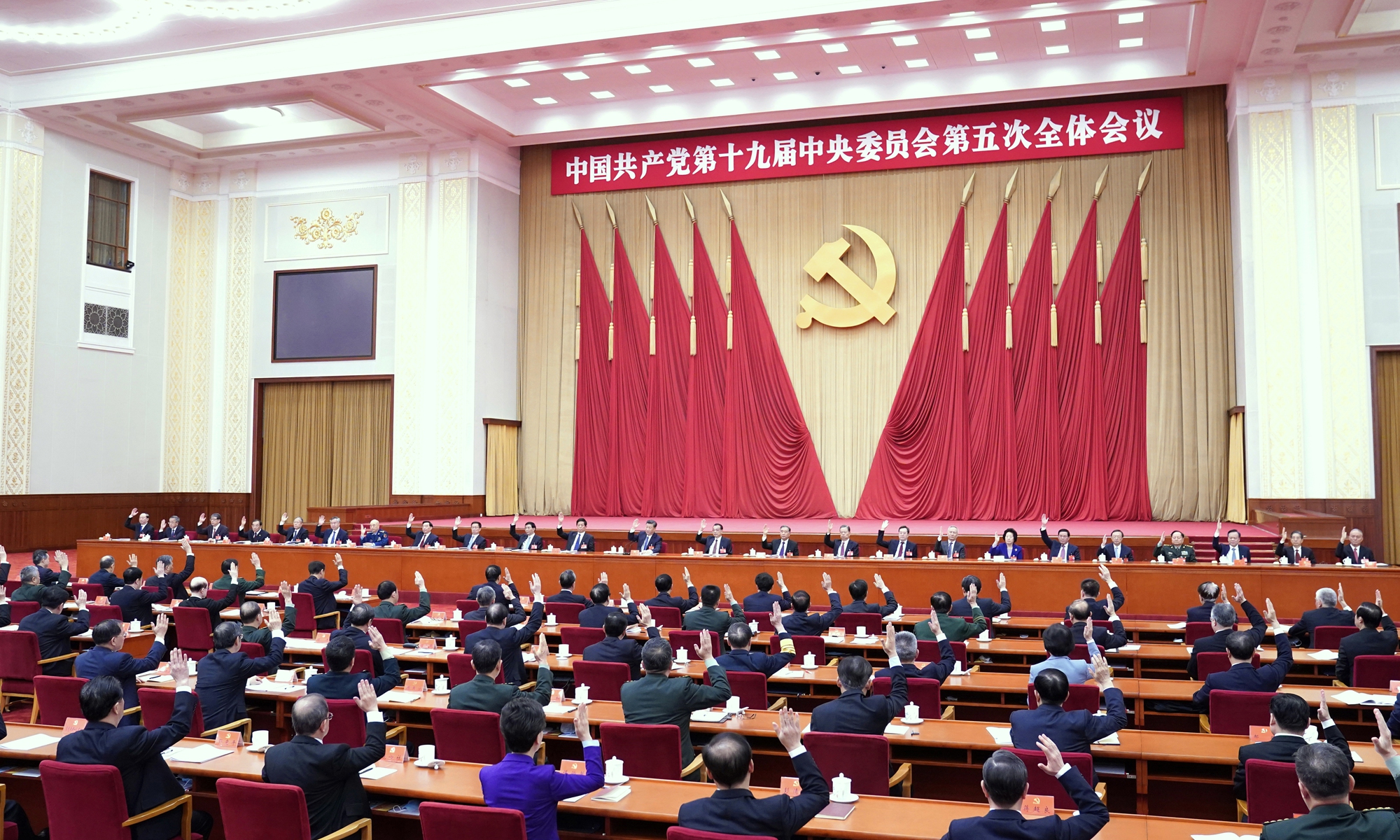New 5-year plan to tackle external interference in HK and Taiwan
By Cao Siqi Source: Global Times Published: 2020/11/3 21:48:27

The Fifth Plenum of the 19th Central Committee of the Communist Party of China concludes on Thursday. A communique was passed at the session which was held from Monday to Thursday. The session also adopted the CPC Central Committee's proposals for the formulation of the 14th Five-Year Plan (2021-2025) for National Economic and Social Development and the Long-Range Objectives Through the Year 2035. Photo: Xinhua
The proposal of China's new five-year plan stressed high alert to outside interference in Hong Kong and Macao affairs, and vowed to resolutely contain those activities in Taiwan to safeguard national sovereignty and stability.
Experts believe the adjustment shows that China is drawing lessons from the implementation of the "one country, two systems" principle in the past five years, and has realized that compared to the economic role of the special administrative regions in national development, political environment and social governance are the weaknesses which urgently need to be strengthened, especially when deep collusion with outside forces in Hong Kong poses a huge challenge to stability.
The full text of the Communist Party of China (CPC) Central Committee's proposals of a blueprint for China's development in the next 15 years was made public on Tuesday. The document, the Party leadership's proposals for formulating the 14th Five-Year Plan (2021-2025) for National Economic and Social Development and the Long-Range Objectives Through the Year 2035, was adopted at the fifth plenary session of the 19th CPC Central Committee which closed on Thursday.
"There will be many unstable and uncertain factors in the external environment in the coming period, as many risks and hidden dangers may impact the domestic economic development," Xi Jinping, general secretary of the CPC Central Committee, said in an explanatory speech on the proposal.
Different from the 13th Five-Year Plan (2016-20) which focused more on the economic, cultural and education cooperation in the regions, the 14th Five-Year Plan highlights the overall governance of the central government over the special administrative regions, stressing the implementation of the law and enforcement mechanism on safeguarding national security.
China should resolutely guard against and contain outside interference in Hong Kong and Macao affairs, reads the new plan.
"Previously, the five-year plans highlighted enhancing Hong Kong's influence in global development, and consolidating financial and trade roles. However, the deteriorating political environment and chaotic social environment, which bred outside interference, pose a substantial threat to the city's future," Li Xiaobing, an expert on Hong Kong, Macao and Taiwan affairs from Nankai University in Tianjin, told the Global Times on Tuesday.
The new plan aims to shore up the weakness, he said.
The new plan emphasizes an enhancement of the national awareness and patriotism of compatriots in the two cities, while also stressing support to better integrate Hong Kong and Macao into the development of the country, develop the Guangdong-Hong Kong-Macao Greater Bay Area with high quality, and improve policies and measures to make it easier for Hong Kong and Macao residents to develop on the mainland.
Analysts pointed out that writing the national awareness and patriotism education in the plan is consistent with the Chinese top leader's speeches.
"After having been through social turmoil that left scars on their hearts, the young generation's ideology and awareness determine the city's future," Li said.
On the Taiwan question, the 13th Five-Year Plan starts with adherence to the 1992 Consensus and the one-China principle, upholding the "two sides of the Taiwan Straits are one family." However, in the new plan, it begins with the promotion on the peaceful development of cross-Straits relations and the reunification of nation.
Li believes it shows the country has strengthened its determination and speeds up its process on reunification, as outside intervention and Taiwan secessionists' going their own way have caused great uncertainties.
The new plan also focuses on improving systems and policies to ensure the well-being of Taiwan compatriots and equal treatment for them and mainland residents, and supports Taiwan businesses in participating in the Belt and Road initiative in the national development strategy. It also vows to support qualified Taiwan-funded enterprises to list on the mainland.
"The policy package tells people in Taiwan that the smart ones will realize that the reunification will be the only and best choice," Li said.
Posted in: POLITICS,HK/MACAO/TAIWAN